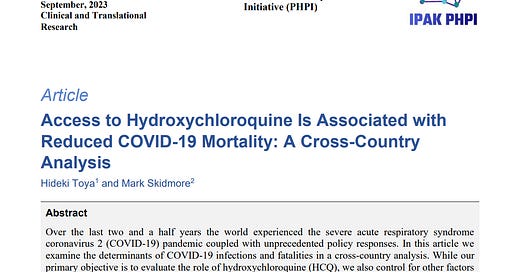Deadly Policy: Peer-Reviewed Cross-Country Study Finds That Routine Hydroxychloroquine Access May Have Prevented Over 520,000 COVID-19 Deaths
Countries that restricted access to hydroxychloroquine had higher fatalities. National lockdowns had no effect on fatalities.
A comprehensive cross-country analysis to identify the factors affecting COVID-19 infections and fatalities found that lack of access to hydroxychloroquine was a major factor in driving COVID-19 deaths. The study, which was published today in the Public Health Policy Research section of the IPAK PHPI open-access journal, Science, Public Health Policy & the Law, controlled for other variables like obesity, urbanization, age, healthcare infrastructure, and policy responses such as lockdowns and travel restrictions.
A key finding of the studies included was a robust negative relationship between access to HCQ and COVID-19 fatalities. Countries that restricted access to hydroxychloroquine had higher fatalities. The analysis model resulted in an estimate that around 520,000 fatalities could have been avoided if HCQ had been made widely available in countries where it was restricted.
The study also found that obesity, older populations, fewer hospital beds, and less sunshine were associated with higher rates of infection and fatalities.
In contrast to these factors, which were significant across multiple models, national lockdowns were never significantly associated with lowered mortality rates, and local lockdowns were only significantly associated with lowered mortality rates in one model. The study therefore found that policies like lockdowns, travel restrictions, and mask mandates were generally not associated with a reduction in fatalities. PCR testing was, positively associated with reported infections, but not with fatalities, which the authors attribute to the high false positive rate of the use of non-quantitative PCR testing to assess COVID-19 diagnostic status.
A strong point in the study's design is the author’s address of the issue of endogeneity. The authors used malaria prevalence as an instrumental variable for HCQ availability and found the result was robust and not due to confounding variables. Endogeneity in this context refers to the potential problem that the relationship between HCQ availability and COVID-19 fatalities might be confounded by unobserved variables or reverse causality. The authors found that endogeneity was not an issue for the relationship between HCQ and fatalities.
Public Health and Policy Implications
The negative association between HCQ availability and fatalities is an important one. Policies on HCQ availability and use should be reconsidered given these results, which should be interpreted in light of the massive compilation of studies that show a net protective effect of early use of hydroxychloroquine in the COVID-19 public health and clinical settings (now 552 studies; c19hcq.org). Countries that have restricted the use of HCQ in the past should now abandon the deadly policy.
HCQ for COVID-19: real-time analysis of all 552 studies (c19hcq.org)
The totality of evidence available on hydroxychloroquine efficacy provides a good starting point for further research and policy discussion.





The "hospital beds" factor is interesting. Since we know that hospital protocols killed many people, I wonder what it was about having more access to hospitals that was still beneficial. Or is it because many other countries did NOT use those deadly protocols, so the number of hospital beds was predictive of supportive care/treatment?
HCQ was what I used during the last 3 years in RN school. Worked great. Prefer it over IVM. PS Thanks for the treatment links. I like the journal! Now I finally have one I can trust : )